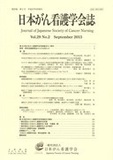Japanese
English
- 販売していません
- Abstract 文献概要
- 参考文献 Reference
- サイト内被引用 Cited by
要旨
本研究の目的は,外来化学療法を受けるがん患者の心身緊張状態と緊張緩和のための対処過程を明らかにし,緊張緩和を促進する看護実践への示唆を得ることである.
外来化学療法を受けるがん患者8名を対象とし,参加観察および半構造化面接によりデータを収集し,修正版グラウンデッド・セオリー・アプローチの手法を用いて分析した.
分析の結果,外来化学療法を受けるがん患者の心身緊張状態と緊張緩和のための対処過程は,《多様な身体感覚を自覚しながら心身緊張に気づいていく》および《手応えを感じながら心身緊張緩和の方略を獲得し,緊張緩和に向かう》をコアカテゴリーとする過程として説明された.【単一の因果では説明できない振幅の大きな繰り返される身体感覚】を有した患者は,【行動や身体感覚の変化を自覚する】【日常生活が変わってきた】『外観や行動の変化を他者から知らされる』ことで【心身緊張が浮かび上がる】体験をする場合もあれば【心身緊張とは気づかないままに過ごす】場合もあった.いずれの患者も身体感覚に対して【外来化学療法開始前から持ち合わせている緩和方法を行う】【抗うことなく選択した受動的な方法を使う】『刺激とならないように言動や行動を制御する』【関心を外に向けるための時間や場所をつくる】【同じ体験者とのつながりを活用する】【次の治療に臨む準備をする】という対処方略により,【緩和の手応えを実感しながら評価する】ことで最終的に心身緊張の緩和がみられていた.これらのことから,患者が早期に心身緊張に気づき,緩和方略を獲得していける看護実践の必要性が示唆された.
The purpose of this study was to clarify the coping processes for psychosomatic tension and tension alleviation of cancer patients undergoing ambulatory chemotherapy, and to obtain suggestions for nursing practices that promote tension alleviation. The subjects were eight cancer patients undergoing ambulatory chemotherapy. Data was collected through participant observation and semi-structured interviews. The data was then analyzed using a modified grounded theory approach.
As a result, the coping processes for psychosomatic tension and tension alleviation of cancer patients undergoing ambulatory chemotherapy could be divided into two core categories: “becoming aware of psychosomatic tension while conscious of various somatic sensations” and “being subjected to psychosomatic tension alleviation strategies while heading towards tension alleviation.” In this process, if patients had “large-amplitude, repeated somatic sensations that cannot be explained by a single cause and effect,” some of them experienced an “emergence of psychosomatic tension” due to “being aware of changes in somatic sensation and behavior,” “changes in everyday life taking place,” and “being informed by others of changes in behavior and appearances” while others would “live without being aware of psychosomatic tension.” In both cases, the patients experienced alleviation of psychosomatic tension through “repeated evaluation while feeling alleviation.” This was made possible by using the following somatic sensation coping strategies: “perform the same alleviation methods used before the beginning of ambulatory chemotherapy”; “use the passive methods selected without resistance”; “control speech and behavior so the patient remains unstimulated”; “create time and space for shifting their interest outward”; “utilize connections with people with the same experiences”; “prepare to face the next treatment.”
Based on these results, a need has been suggested for a nursing practice that helps patients become aware of their psychosomatic tension at an early stage.
Copyright © 2015, Japanese Society of Cancer Nursing All rights reserved.


